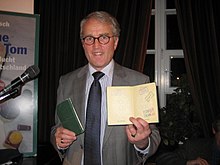Rüdiger von Fritsch
Rüdiger Freiherr von Fritsch (also Rüdiger Freiherr von Fritsch-Seerhausen ) (born December 28, 1953 in Siegen ) is a retired German diplomat . Most recently he was Germany's ambassador to Russia from March 2014 to June 2019 .
Life
Rüdiger von Fritsch graduated from the Schloss Salem boarding school in 1973 and studied history and German in Erlangen and Bonn. During his studies he received a scholarship from the German National Academic Foundation . In 1984 he joined the Foreign Service and worked as a political advisor at the German embassy in Warsaw from 1986 to 1989 , one of the tasks being to maintain contact with the then illegal opposition. From 1989 to 1992 he worked as a consultant for press and cultural affairs at the German embassy in Nairobi. After assignments at the headquarters of the Foreign Office (press department) and at the German EU representation in Brussels (1995–1999, German member of the Antici group and negotiations to prepare for the eastward expansion of the EU), he headed the planning staff of the Federal President from 1999 to 2004 . From 2004 to 2007 von Fritsch was Vice President of the Federal Intelligence Service .
From 2007 to 2010 he headed the Department of Economics and Sustainable Development at the German Foreign Office and was the representative of the German Sherpa in the G8 negotiations. From July 2010 to March 2014 he was the German ambassador in Warsaw. His successor there was Rolf Nikel , who was previously the Federal Government Commissioner for questions of disarmament and arms control.
Since then, until his retirement in July 2019, he represented Germany as ambassador to Russia.
Non-fiction author
In 2009 von Fritsch published the book The Case with Tom - A Flight in Germany , which tells of how he and his brother Burkhard helped a cousin and his friends escape from the GDR to the Federal Republic in 1974. Hans-Dietrich Genscher judged the book: “A courageous deed and an impressive book that brings the bitter reality of the division of Germany to life in a most vivid way,” the historian Heinrich August Winkler said: “I have seldom read a book that does well as this succeeds in inserting an individual case that is exciting enough in itself into a large historical panorama ”.
Kamila Gierko and Winfried Lipscher translated the book into Polish in 2012 : Stempel do wolności. Ucieczka z Niemiec do Niemiec . In April 2015, the main parts of the book were published in Russian under the title штемпель в свободный мир (“Stamp to the Free World”) in the Moscow literary magazine иностранная литература (“Foreign Literature”, issue 4/2015). In 2016 a Bulgarian edition of the book was published under the title: “Печат към свободата. Бягство от Германия към Германия “(stamp on freedom, an escape from Germany to Germany).
Private life
Rüdiger von Fritsch is a Protestant. He is with Huberta, geb. Married Freiin von Gaisberg- Schöckingen. The couple have five children.
He is a brother of the manager Wolfram Freiherr von Fritsch , a descendant of Thomas and Jacob Friedrich Freiherrn von Fritsch and a great-nephew of Werner Freiherr von Fritsch .
Web links
- Literature by and about Rüdiger von Fritsch in the catalog of the German National Library
- Germany changes ambassador in Moscow at ria.ru
- The thing with Tom at Perlentaucher.de
- The ambassador's curriculum vitae on the website of the German representations in Russia ( memento from March 30, 2018 in the Internet Archive )
Individual evidence
- ↑ Announcement on appointments , spiegel.de, January 15, 2014, accessed on January 20, 2014
- ↑ Merkel's husband in Moscow. In: sueddeutsche.de. Retrieved November 1, 2019 .
- ↑ Archived copy ( Memento from July 30, 2014 in the Internet Archive )
| personal data | |
|---|---|
| SURNAME | Fritsch, Rüdiger von |
| ALTERNATIVE NAMES | Fritsch, Rüdiger Freiherr von; Fritsch-Seerhausen, Rüdiger Freiherr von |
| BRIEF DESCRIPTION | German diplomat |
| DATE OF BIRTH | December 28, 1953 |
| PLACE OF BIRTH | Wins |

